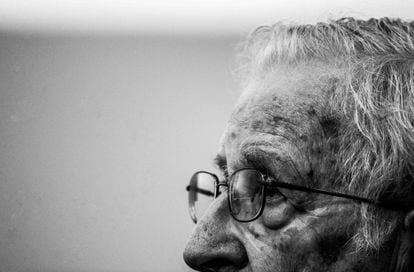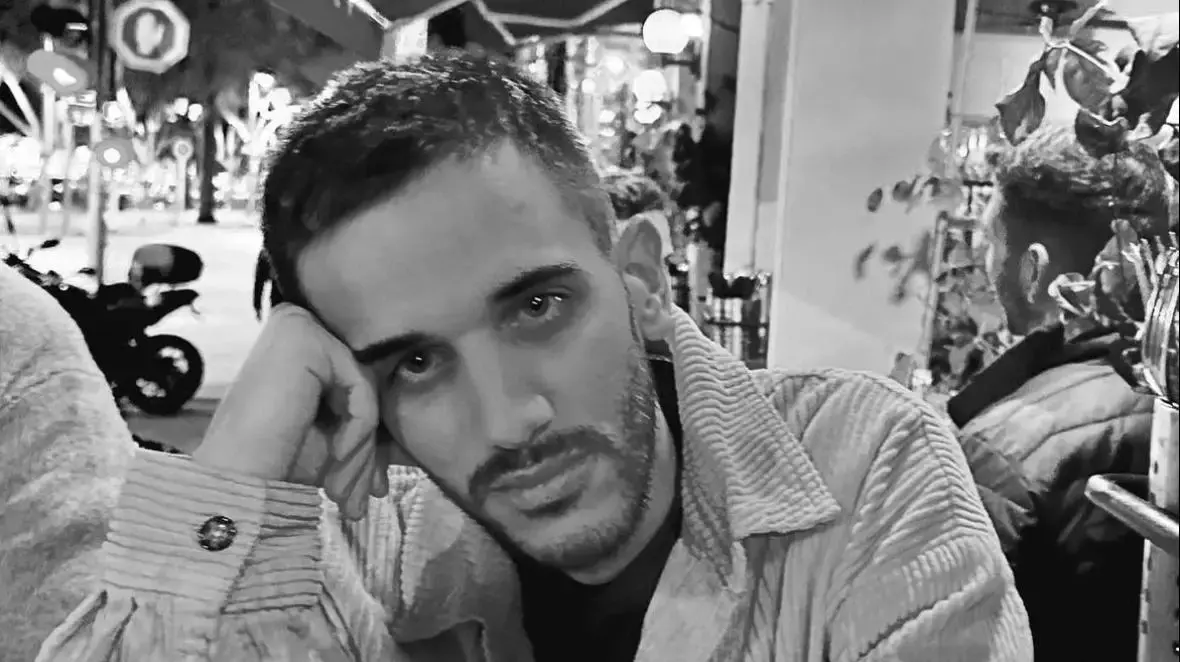Noam Chomsky offers a lecture at the University of Sonora, in Mexico, in March 2018.Alamy Stock Photo
Noam Chomsky (Philadelphia, 93 years old) is still in the gap. He writes, gives lectures and interviews, and is in the front line of fire for what he believes is right. He is part of the European progressive movement Diem25, has raised the alarm about the risks of climate change and has become a scourge of Trumpism. He is one of the greatest living intellectuals of the American left, but also the father of modern linguistics, having established, in the 1950s, the theory of generative grammar. A long-winded author, renowned philosopher, and incorruptible activist, he was arrested for opposing the Vietnam War, blacklisted by Richard Nixon, and supported the publication of the
Pentagon Papers
.
Incorruptible, but also pragmatic, he devoted himself, for example, to asking for the vote for Joe Biden in the 2020 elections. Since 2017 he has lived in Tucson (Arizona), from where he attends this interview [which could not be done in person, nor from the that photos could be taken due to covid precautions] by videoconference. With also incorruptible punctuality, the old professor's gray hair appears on the screen at the precise time. The years have cracked his voice, but not his thought. He expands on the answers, but does not ramble and responds to all the nuances. His book
On Anarchism
has just been reissued in Spanish (Captain Swing). The old professor will talk about it, but also, something that usually costs him, about himself.
Ask.
Did you really write your first essay when you were only 10 years old and was it about the Spanish Civil War?
Answer.
Yes, and I can tell you the exact date because it was about the fall of Barcelona, so it was in February 1939. It wasn't a great article, but it was about the spread of fascism in Europe, in Germany, Austria, Czechoslovakia... From my point of view Seen from a 10-year-old boy, it seemed that the world was going to end, that fascism was uncontrollable.
P.
That boy worked in a newsstand in New York that his uncle ran and it ended up becoming a meeting place for European intellectuals who could spend entire nights arguing.
Did that plant a seed in you?
R.
There is a good dose of tragic irony in that question. Mine was a family of immigrants, mainly unemployed. I grew up during the Great Depression, in the early 1930s, but there was an atmosphere of hope, aspiration and expectation due to the movement of work. That movement had been crushed in the 1920s, but it was making a comeback. There were radical political parties, there was debate, discussion, a feeling that we could get out of this together. In Europe, the reaction to the Great Depression was fascism, with Franco, Mussolini or Hitler, but in the United States the reaction was social democracy. the
new deal
Roosevelt's led to an era of modern social democracy that was later repeated in Europe.
If you look at the current crises instead, Europe is still clinging to a social democracy, but the United States is headed for proto-fascism
,
the opposite of what happened in my childhood.
Q.
And doesn't this pandemic also provide an opportunity for that kind of catharsis, a "we can get out of this together"?
A.
It should be and there are some signs of it if you go down to the community level.
You find people cooperating and helping each other.
The favelas of Brazil are among the most miserable places in the world and during this pandemic we have seen how the same criminal gangs that have terrorized them are organizing people to deal with this situation and to help each other.
But if we go to the leaders of the main countries, we find that they monopolize vaccines and ask that pharmaceutical multinationals maintain the exorbitant control of patents, rights granted by a neoliberal regime that is opposed to true free trade.
In the United States, attempts to develop simple social measures are blocked by neoliberal ideology.
Noam Chomsky
Q.
You say that the United States is leading the way to proto-fascism,
Why are far-right movements making such strides, not only in the United States, but also in Europe?
R.
Private capital and private wealth have taken the lead. Of course, they have always dominated the system, also in Spain, but in the last 40 years they have gained overwhelming power and wealth. The Rand Corporation, which is a highly respected institution, did a study on the transfer of wealth from the working class to the upper class and found that 90% of the population had lost weight in wealth in favor of the richest, in favor of the richest 1% mainly. And there are many other ways to steal from people. Ronald Reagan opened the door to tax havens, for example. It has been a very destructive time for workers. In real terms, a male worker earns the same as in 1979. In Europe, austerity programs have harmed the poor and enriched the rich.This has led to a resentment that is fertile ground for demagogues like Donald Trump or Viktor Orbán and they are capitalizing on it.
Q.
One year after the assault on the Capitol, what are the consequences?
R.
That was an attempt to overthrow an elected government. And it was very explicit on Trump's part: "The elections have been stolen, we are going to the Capitol." An attempt to topple an elected government is a coup. It was a violent coup attempt. A group of Republicans refused to be part of it and prevented it from succeeding. But that attempt has now been followed by a soft hit, which is happening every day before our eyes. Republicans are planning carefully so that next time it will be successful. [Through electoral reforms in different conservative states] they are making sure that the people who manage the elections have the power to annul votes and they are passing dozens of laws to prevent the
wrong people from voting.
, minorities and the poor [through tougher voting requirements].
The Republican Party is no longer a political party, it is a neo-fascist party.
The United States is a technologically and culturally advanced society, but it is pre-modern in other areas.
And Trump is a very effective demagogue, he has known how to shake the poisons that run under the surface of American society and has brought them to the surface.
Now there is a group that venerates him as a Duce II, chosen by God, it is the people who stormed the Capitol.
American democracy is in grave danger.
Noam Chomsky during a conference at the University of Sonora, in Mexico, in 2018. Alamy Stock Photo
Q.
And do you think Trump could run or even win in 2024?
A.
It is very possible. He has a rabid base of devotees who worship him. He has the GOP leaders terrified, they all run to Mar-a-Lago [Trump's Palm Beach area] to shine his shoes and get his blessing. If they succeed with the current coup under way, to control and modify the electoral system, they can win. Remember that we have a very reactionary electoral system, which gives white, rural, conservative areas an overwhelming structural advantage. For example, in the Senate, a state like Wyoming, with 578,000 inhabitants, has two votes. California, with 40 million, has two votes. If now the US wanted to enter the European Union, the European Court of Justice would knock it down.
If we had asked my grandmother if she was oppressed, she would not have understood.
Knowing what it is takes work
Noam Chomsky
Q.
Has the first year of the Biden administration been more progressive than you expected?
R.
Well, I wasn't expecting much, frankly, but the national programs have been better than I expected. They were largely designed by Bernie Sanders, who represents the most progressive wing of the Democratic Party. But they have been cut by the opposition and almost nothing has been achieved. The main one [the great social reform plan called Build Back Better, which is the largest expansion of the welfare state in decades] is badly needed. The United States is a lagging country in social benefits. Take for example maternity leave, there are about six countries in the world that do not have it. Well, Republicans oppose [implementing it]. And Joe Manchin [the centrist Democratic senator] has blocked it. It is the richest country in the worldbut attempts to develop simple social measures are blocked by private capital and neo-liberal ideology.
Q.
Do you still consider yourself an anarchist?
What does that mean?
R.
It is a term that has been used in many ways, just like liberal, conservative, socialist or Marxist. The basic idea is that any form of hierarchy, domination or authority in any aspect of life must be justified and shown to be legitimate, it is not justified in and of itself. If a community democratically decides to follow traffic rules, such as driving on the right and stopping at a red light, it is submitting to an authority, but it can be argued that it is legitimate. However, very few relationships stand up to this criticism, and an anarchist's job is to uncover them, reveal them, and get people to debate them to see if they legitimize or change them. Not even the first step is easy. If you had asked my grandmother if she was oppressed, she wouldn't have known what you were talking about.Women lived as they were supposed to, taking care of the house, the children and obeying their husband. It was not oppression, it was life. Discovering that this is oppression requires work.
P.
And at work?
A.
What is a job? For most people it means spending most of your waking hours following the orders of a totalitarian boss, who can give orders in ways even Stalin could not dream of. Stalin would not have been able to tell someone that they have five minutes to go to the bathroom or that they cannot talk to the person next to them. You may have a nice boss who will let you, but it's their decision. That is called having a job, and people react like my grandmother, thinking that it is normal. At the beginning of the industrial revolution, workers opposed this form of autocracy that took away their rights and dignity. It is something that is being revived. In fact, many people are refusing to go back to work with this so-called Grand Resignation, they are saying that in their own way.
Now there is a group that worships him [Donald Trump] as a Duce II, chosen by God.
It's the people who stormed the Capitol
Noam Chomsky
P.
But the economy needs a certain degree of organization and that implies authority.
A.
Of course, you have an example in Spain.
Look at Cooperativa Mondragón, it's been around since the 1950s and it's a conglomerate owned and largely run by workers.
You can find fault with it, but for the most part, to a rare extent in the world, it is a successful conglomerate based on the idea that the participants in a community should control it.
P.
In your book you talk about consent, the acceptance of authority by people even if it is not justified. What is more natural in the human being, the hunger for freedom or the need for authority?
A.
Our nature as participants in the social order has many options and can believe many things.
Classical liberals, like Wilhelm von Humboldt, believe that our instinct is freedom.
They believe that the essence of human nature is freedom from arbitrary coercion.
The classical liberal thinker in England, John Stuart Mill, believed that a company should be owned and operated by the workers.
That is classical liberalism.
Of course, all of this was crushed by capitalism, which took a different course of authority and domination and, in its most extreme and savage form, the kind of neo-liberalism imposed in the last 40 years, with devastating effects everywhere.
Q.
Do you consider yourself a pragmatic thinker?
A.
Yes, we should do what we can, not look for what we can't. There is no point in romantic gestures, which will not only fail, but will lead to the worst results. We must face the world as it is and act to improve it. I had friends in the sixties who decided they wanted a revolution, so they would go to a factory, say General Electric, and start handing out copies of Mao's Red Book to doors, to organize people to do that. revolution. You can imagine what happened, that is not the way to achieve change. What they did was strengthen support for reaction and support for the war. You have to face the world as it is, not as you would like. You have to try to build the world that you would like, but facing it as it is.
Conservative in the face of global change
Chomsky, as strange as it sounds, defines himself as a conservative in the face of social change.
“Among the many uses of the term conservative, one is classical liberal.
The term is still used, but not in the sense that its creators intended.
Wilhelm von Humboldt said that if the craftsman produces something beautiful to order, we will admire what he has done, but we will despise what he is, someone who works to order, not according to what grows in his internal development.
That is the core of classical liberalism and in that sense I am a conservative.
Also, in other respects, I think our basic institutions need very substantial and radical changes, but I don't think it can be done just like that.
You have to build a debate for it,” he explains.
When asked for an example, she points to the women's rights movement, which dates back centuries but made a big difference in the 1960s. “How was it achieved? Groups of women, especially young women, got together, had discussions, discovered and thought about the types of oppression that existed, decided that they did not have to submit, organized other women and created a large-scale movement. With that, sooner or later you will have substantial changes. But it is not an easy process, many reject it and will say that they want that authority.”
The American intellectual is exasperated by the political response to global warming.
“Environmental destruction is coming whether we like it or not, and our institutions are not in a position to deal with it, as we saw in Glasgow [at the climate conference].
The main decision they made was to postpone the decision until next year and, meanwhile, the earth is burning”, he explains.
In his opinion, “the big banks say nice words about the need to do something, but what they are doing is financing fossil fuels with trillions of dollars.
Those are our institutions, and if we can't control them, we're finished."
Subscribe here
to the weekly Ideas newsletter.
Sign in to continue reading
Just by having an account you can read this article, it's free
RegisterLogin
Thanks for reading THE COUNTRY














